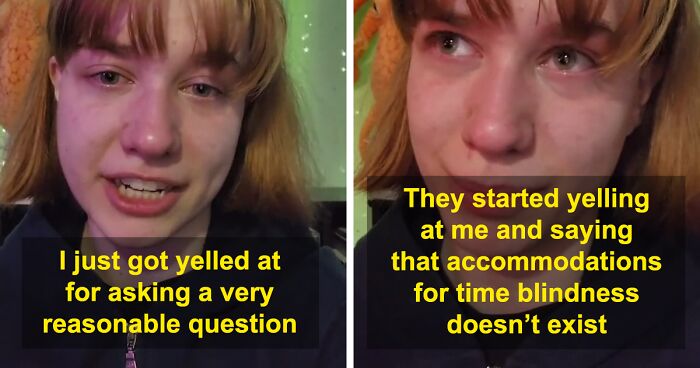
Woman Who Struggles With Time Blindness In Tears After Being Yelled At A Job Interview
Looking for a new job can be very stressful. And job interviews aren’t there just to check if you’re a good fit for the company—you also want to see that the company fits you, your style of work, and your values well. And probably the last thing you’d expect is for recruiters to mix up neurodivergence with ‘entitlement.’
TikToker Sarah, @chaotic_philosopher, recently went viral and divided social media when she shared how she got yelled at for asking a question about time blindness—the difficulty of sensing the passage of time. It’s a real disorder that some people with ADHD, and others, may struggle with. While some people were on the TikToker’s side, others were less sympathetic. Scroll down for the full story. Bored Panda has reached out to @chaotic_philosopher via email and we’ll update the article as soon as we hear back from her.
Meanwhile, Bored Panda wanted to learn more about time blindness, how it differs from laziness, and the impact it can have in the workplace, so we reached out to Ainsley Hawthorn, Ph.D., an international expert in sensory studies, author, and the host of The Sensory Revolution blog on Psychology Today. Read on for the insights she shared with us.
More info: TikTok | Twitter | Instagram | YouTube
After an awful job interview experience, one woman took to TikTok to share how a recruiter reacted to her question about time blindness
Image credits: wayhomestudioo (not the actual photo)
“So I just got yelled at for asking a very reasonable question”
Image credits: chaotic_philosopher
“I’m applying to go somewhere, and I just wanted to know, are there accommodations for people who struggle with time blindness and being on time, you know?”
“And then the person I was with interrupted and acted like I was asking something else.”
Image credits: chaotic_philosopher
“When we were done, they actually started yelling at me and saying that accommodations for time blindness doesn’t exist”
“And if you struggle with being on time, you’ll never be able to get a job. You know, provided you’re trying your absolute best to be there. And then they’re like, ‘your stupid generation wants to destroy the workplace.'”
Image credits: chaotic_philosopher
“I think that a culture where workers are just cut off because they struggle with being on time when there’s other solutions that we can look to”
“I think that just anybody who thinks it’s okay to just treat people like that, yeah, that culture needs to be dismantled. And then I ask that person, ‘how can you feel good about yourself upholding this kind of system?’ And then to think I’m entitled, no. If people think it’s okay to treat others like this, that’s entitlement.”
The TikToker’s video was viewed over 5.3 million times. You can watch it in full right here
@chaotic_philosopher I’m tired of workers’ rights not being prioritized in this country. And we’re entitled for suggesting it should be different… I don’t think so. #workersrights#employeerights#workers#capitalismsucks#capitalism#thesystemisbroken#fyp♬ original sound – ♻️🌎Chaotic Philosopher♾️🇺🇸
The topic started a massive discussion on the internet
The TikToker’s one-minute video went massively viral. At the time of writing, it was viewed 5.3 million times and counting. What’s more, it got 202k likes and nearly 49k comments. The discussion the clip started was very intense.
The main question here for many internet users was whether the content creator was being sincere about struggling with time blindness and whether she was putting in all the effort that she could to be punctual.
While some folks were relatively reasonable and wanted to have a genuine conversation with the TikToker, others were far from friendly. They called out the content creator for trying to disguise laziness as time blindness. Others were slightly confused about how workplaces can realistically accommodate people who struggle to notice the passage of time. After all, punctuality and meeting deadlines are core parts of practically any job.
Time blindness can also affect people other than those suffering from ADHD
“Time blindness is a difficulty with a perception of time, how much time is passed, how much time it’s going to take to do something, and it can be quite impairing to people. It is a real thing that’s been researched,” psychotherapist Stephanie Sarkis told USA Today. According to her, time blindness is something that people with depression, anxiety, bipolar disorder, PTSD, and other mental health conditions aside from ADHD can also struggle with.
“It’s not exclusive to ADHD, but it does impact ADHD quite a bit,” she explained. “We all have different strengths and weaknesses,” she says. “Not only do we positively reinforce people’s strengths, but we also need to be kind and understanding about people’s weaknesses, and getting upset with someone isn’t going to improve that weakness.”
Meanwhile, psychologist and ADHD specialist Ari Tuckman pointed out people who are grieving, drunk, stressed, or sleep-deprived can also experience time blindness. Though in these cases, it’s temporary.
“We all have some sense of time. This ability to see and be aware of time, it’s a human ability that’s on a spectrum. Some people are really good; some people are not as good,” the expert said.
Alarms, calendars, and apps can help mitigate the negative effects of time blindness
There are various ways how people with time blindness can ensure that they’re staying punctual and don’t miss important events and deadlines. The most important thing is embracing how technology can help you: alarms and various apps can act as constant reminders so you don’t forget.
It’s also essential to take care of your physical and mental health, including getting plenty of sleep, having a healthy diet, moving lots, and having a thriving social life. It’s also important to see a mental health expert who specializes in ADHD so that they can help you treat the condition, whether through lifestyle changes or with the help of medication.
Meanwhile, Verywell Mind suggests that people with time blindness time themselves on tasks, breaks, and projects with the help of apps or spreadsheets. It’s also useful to add some extra time to your schedule for each task in case you lose track of everything: every activity tends to last longer than people think they will. In the meantime, playing some music in the background can help with focus.
“We naturally tend to assume everyone perceives the world the same way we do, when that’s not really the case”
“Many of the consequences of time blindness, like being late, missing deadlines, or forgetting to respond to messages, are ones we associate with laziness, but laziness implies choice. When we say someone is lazy, we mean they had the option to be productive but instead made the decision to relax, to dawdle, or to procrastinate. Time blindness isn’t a choice but a symptom linked with conditions like ADHD, autism, anxiety, depression, and traumatic brain injury,” Hawthorn explained to Bored Panda via email.
“All of these conditions impair executive function, the skills that allow a person to plan ahead and take step-by-step actions to achieve long-term goals. A time-blind individual generally wants to be punctual, to make deadlines, and to answer messages promptly, but their inability to track time constantly gets in their way. Laziness is relaxing, an escape from the pressures of work, but time blindness is stressful. It prevents a person from doing tasks they themselves care about and leads to feelings of inadequacy and self-doubt.”
We were curious about what could help others to empathize more with those suffering from time blindness. Sensory studies expert Hawthorn was kind enough to shed some light on this. “We naturally tend to assume everyone perceives the world the same way we do, when that’s not really the case. There are many types of sensory differences and disabilities. We have no trouble accepting that a person can be color blind or tone deaf, so why do we struggle to accept that someone might have impaired time perception?”
According to the expert, this may be because we tend to give behaviors like punctuality moral value. However, not all cultures do so. “The majority of the population, who have no trouble tracking time, have no reason to change this way of thinking because it allows them to feel virtuous for something that comes easily to them. I believe the best way to learn empathy for others is to listen to or read their stories. It broadens your own mind and makes you more aware of the diversity of human experience,” she told Bored Panda.
“It’s generally a good idea to seek professional advice if a problem like time blindness is interfering with your quality of life”
What’s more, were interested in the effects that time blindness can have for people in the workplace. “Whether you’re traditionally employed or self-employed, the ability to make appointments, meet deadlines, and communicate promptly are fundamental requirements of our working world. These expectations can pose a real challenge for those who suffer from time blindness. Time blind individuals compensate by wearing watches, setting alarms, keeping time logs, and avoiding activities that will cause them to hyperfocus,” the expert said.
“It’s generally a good idea to seek professional advice if a problem like time blindness is interfering with your quality of life. Look for a professional who specializes in neurodiversity and may be more aware of time blindness. If professional support isn’t accessible for you, organizations like Children and Adults with Attention-Deficit/Hyperactivity Disorder (CHADD) or the Centre for ADHD Awareness, Canada (CADDAC) may be able to provide resources and support.
According to Hawthorn, all of us are expected to be more keenly aware of time than ever before. “Mechanical clocks weren’t invented until the late thirteenth century, and standard time wasn’t introduced until 1883. Now we divide up our days into precise increments packed with time-sensitive meetings, messages, and appointments,” she said.
“Human beings historically lived in contexts where time was measured by night and day and by the passage of the seasons more so than in tiny segments of minutes and seconds. So it shouldn’t be surprising that a portion of the population isn’t well adapted to this highly time-sensitive way of living.”
Some TikTokers supported the woman and her position
Other internet users, however, were far more critical. Here’s what they said
Explore more of these tags
I have late phase sleep disorder and my time perception is certainly off, but have never used it as an excuse for anything! I set alarms for things all the time.
I have ADHD and struggle with getting out the door in the morning on time. I have different alarms set for each stage of getting ready: "Out of Bed," "Take Your Shower," "Get Dressed," "Get Your Work Things Together," "Leave Now," and "Seriously, WALK OUT THE DOOR."
Load More Replies...I suffer from "money blindness" so you need to accommodate me and pay me 100x my salary! It's work, they set the schedule, do whatever you have to do to show up on time or find freelance work where you can set your own schedule. It's like being a night watchmen who's scared of the dark, expecting the entire warehouse to be lit up all night to accommodate you.
Load More Replies...So if a person is blind to time, shouldn't they (statistically speaking) be _early_ 50% of the time?
Good point. Does the condition only exist when it benefits her?
Load More Replies...I have late phase sleep disorder and my time perception is certainly off, but have never used it as an excuse for anything! I set alarms for things all the time.
I have ADHD and struggle with getting out the door in the morning on time. I have different alarms set for each stage of getting ready: "Out of Bed," "Take Your Shower," "Get Dressed," "Get Your Work Things Together," "Leave Now," and "Seriously, WALK OUT THE DOOR."
Load More Replies...I suffer from "money blindness" so you need to accommodate me and pay me 100x my salary! It's work, they set the schedule, do whatever you have to do to show up on time or find freelance work where you can set your own schedule. It's like being a night watchmen who's scared of the dark, expecting the entire warehouse to be lit up all night to accommodate you.
Load More Replies...So if a person is blind to time, shouldn't they (statistically speaking) be _early_ 50% of the time?
Good point. Does the condition only exist when it benefits her?
Load More Replies...
 Dark Mode
Dark Mode 

 No fees, cancel anytime
No fees, cancel anytime 






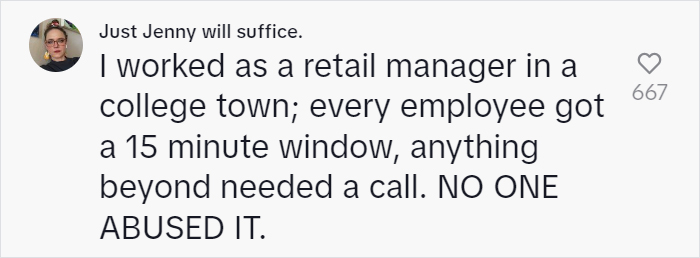



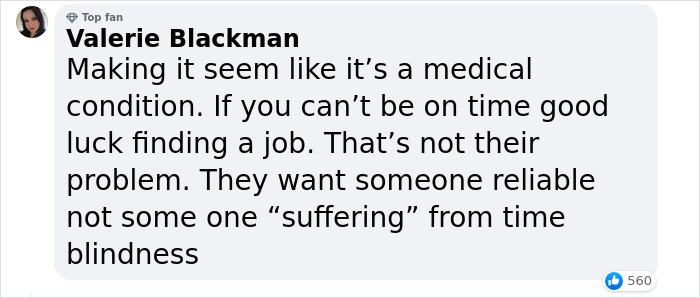








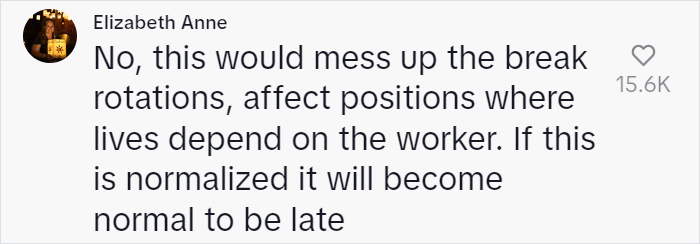

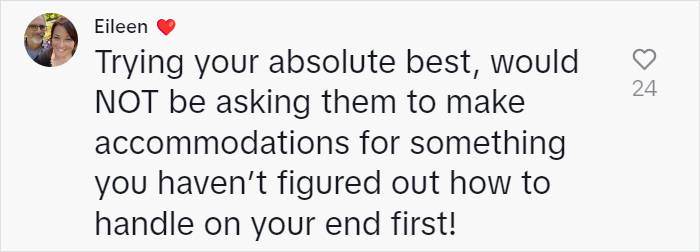


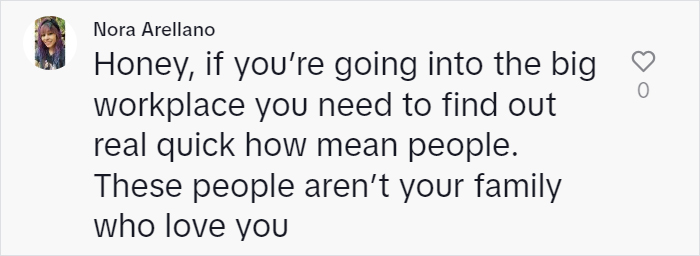



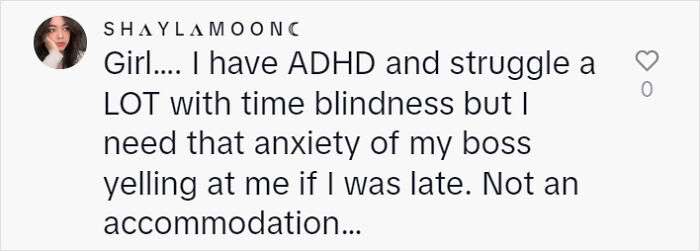













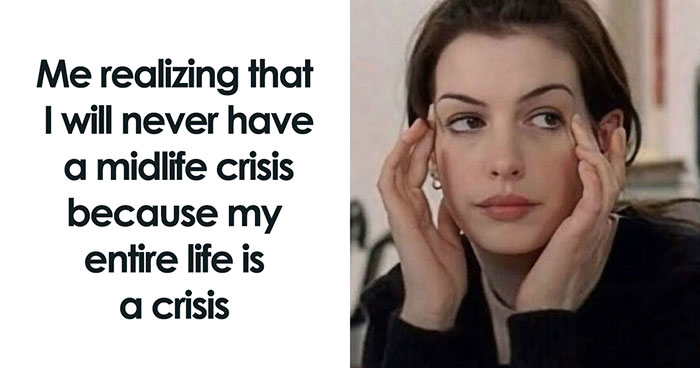



















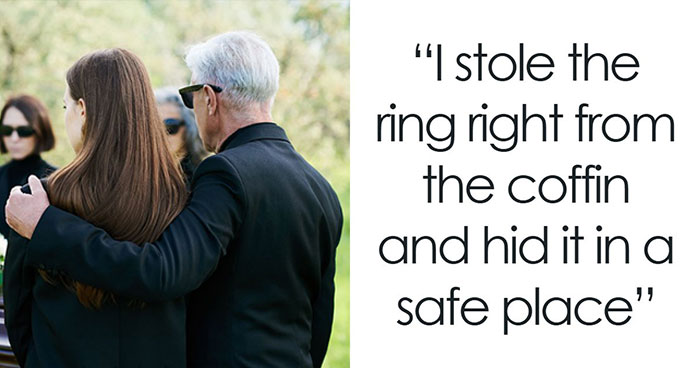











16
190